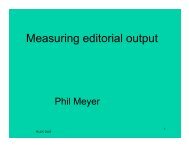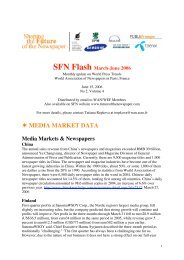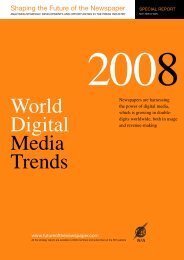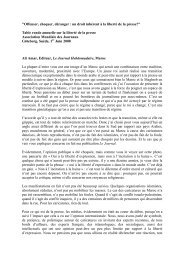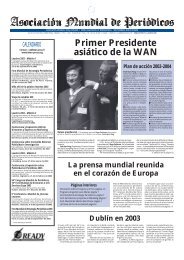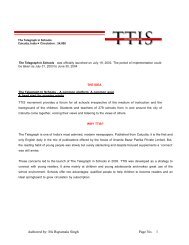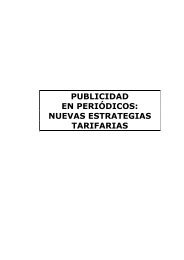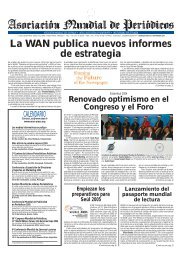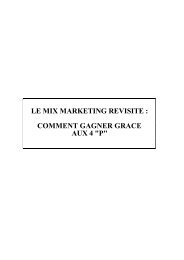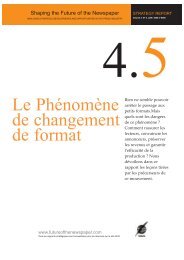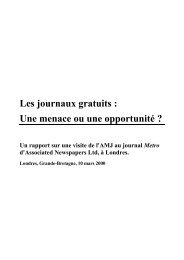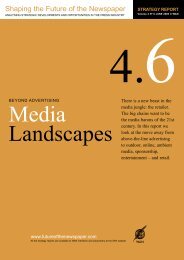WORLD PRESS TRENDS - World Association of Newspapers
WORLD PRESS TRENDS - World Association of Newspapers
WORLD PRESS TRENDS - World Association of Newspapers
Create successful ePaper yourself
Turn your PDF publications into a flip-book with our unique Google optimized e-Paper software.
ITALY<br />
The older scheme for assisting newspapers to modernise has<br />
been incorporated into the new system operated by the fund<br />
for granting loans to publishing companies (Bill No.62, 7 March<br />
2001). The bill introduced a credit tax <strong>of</strong> 3 per cent to help<br />
publishing companies with new investments. Such a facility<br />
relieves publishers <strong>of</strong> the initial cost <strong>of</strong> acquiring new plant and<br />
machinery. It doesn’t include the cost <strong>of</strong> buildings to house the<br />
plant concerned. The credit tax is distributed over a period <strong>of</strong><br />
five years, beginning from 2001.<br />
One <strong>of</strong> the innovations introduced by Bill No.62 consists in two<br />
systems for granting loans. The first one works automatically<br />
for loans not exceeding 516,000 Euros, concerning investments<br />
to be carried out over two years. A government committee will<br />
grant the loan, after merely establishing that the application<br />
was made correctly. The second one is a valuation system for<br />
loans <strong>of</strong> between Euro 516,000 and Euro 15.5 million. In this<br />
case the committee not only checks that the application is valid<br />
but must also assess the financial, technical and economic<br />
soundness <strong>of</strong> the investment plan.<br />
Discounts<br />
on:<br />
post 35-45% rail 0<br />
telephone 50% telegraph 0<br />
telex 0<br />
<strong>Newspapers</strong> with ad content <strong>of</strong> 45% or less may claim the 35-<br />
45% discount from postal rates, determined by weight.<br />
Ownership<br />
Does any law exist governing publishing-house ownership, or the<br />
registration <strong>of</strong> shares in newspaper-publishing companies Yes,<br />
individuals and corporations have to register their newspaper<br />
interests. Magazines with five or more full-time journalists and<br />
more than 12 issues a year count as newspapers for these<br />
purposes.<br />
Is there any law prohibiting or restricting foreign companies or<br />
individuals from owning shares, and in particular, the majority <strong>of</strong><br />
shares, <strong>of</strong> domestic daily newspapers No restriction on EU<br />
countries. Reciprocal arrangements apply to some other<br />
countries.<br />
Is there any law prohibiting daily newspaper or periodical publishers<br />
from operating radio or television stations in the same locality Daily<br />
newspaper publishing companies with more than 16% <strong>of</strong> the<br />
national circulation may not be licensed to own national TV<br />
stations. Circulation between 8% and 16% allows one national<br />
TV station. Under 8% allows two licences.<br />
Law 249, passed on July 1997, has provided, as a general rule,<br />
that no one may control more than 20% <strong>of</strong> all mass media<br />
resources. “Mass media resources” means all revenue coming<br />
from sales <strong>of</strong> daily newspapers and periodicals, sales or<br />
exploitation <strong>of</strong> audio-visual products, subscriptions to dailies,<br />
periodicals, radio and TV stations, advertising (including<br />
sponsorship and telemarketing), licence-fees and regular public<br />
subsidies, and electronic publishing for household consumption.<br />
So as to guarantee disclosure and transparency in the capital structure<br />
and to avert silent partnerships, is there a law or rule making it possible<br />
to determine who actually owns a publishing company Law 416<br />
(Article 1) provides that daily newspapers must be owned only<br />
by individuals, private unlimited partnerships, limited<br />
partnerships (non-stock corporations) and public corporations.<br />
Voting shares or partnership <strong>of</strong> a publishing house may be<br />
registered under the name <strong>of</strong> another company only if the<br />
majority <strong>of</strong> the voting shares <strong>of</strong> this other company are registered<br />
under the name <strong>of</strong> individuals or companies quoted on the stock<br />
exchange, whose identity is thus a matter <strong>of</strong> public record.<br />
Is there an antitrust law limiting concentration in the daily press<br />
Law 416 (Article 4) specifically limits daily press concentration<br />
to 20% <strong>of</strong> all circulation, or 50% in one <strong>of</strong> Italy’s four large<br />
(‘macro’) regions, or half <strong>of</strong> titles in one <strong>of</strong> the 21 smaller regions.<br />
(The latter rule obviously does not apply if there is only one<br />
title.) Any purchase (or equivalent) which breaches these limits<br />
is liable to be declared void in court, but the limits may be<br />
exceeded in the normal course <strong>of</strong> organic business growth.<br />
Is further regulation <strong>of</strong> media concentration expected A new<br />
proposal for changing broadcasting legislation has been put<br />
forward by the government on September 2002. The proposal<br />
is now under active consideration in the Italian Parliament.<br />
According to the proposal, public-service broadcasting should<br />
continue and should be the responsibility <strong>of</strong> the Communication<br />
Authority, which would ensure that the public services are<br />
conducted in accordance with the requirements and objectives<br />
<strong>of</strong> the law. The state-owned public broadcaster RAI should be<br />
transformed into a private company licensed to broadcast<br />
public-service television. The licence should be granted for 12<br />
years.<br />
The proposal provides rules limiting concentration in the so<br />
called “integrated communication system”, strengthening the<br />
power <strong>of</strong> Communication Authority in controlling abuses <strong>of</strong><br />
dominance in the media and communication industries. In a<br />
case <strong>of</strong> breach <strong>of</strong> the rules governing competition and<br />
concentration, the Authority would be able to impose conditions<br />
to abolish the dominant position. As a general rule, a single<br />
company would not be allowed to collect revenue exceeding<br />
20% <strong>of</strong> all resources <strong>of</strong> the “integrated communication system”.<br />
The new proposal would also abolish any specific limit on<br />
newspaper shareholdings in television companies.<br />
<strong>WORLD</strong> ASSOCIATION OF NEWSPAPERS - <strong>WORLD</strong> <strong>PRESS</strong> <strong>TRENDS</strong> 2003 159




